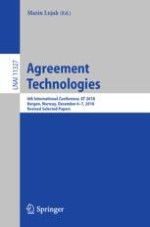2019 | OriginalPaper | Chapter
Automated Negotiations Under User Preference Uncertainty: A Linear Programming Approach
Authors : Dimitrios Tsimpoukis, Tim Baarslag, Michael Kaisers, Nikolaos G. Paterakis
Published in: Agreement Technologies
Publisher: Springer International Publishing
Activate our intelligent search to find suitable subject content or patents.
Select sections of text to find matching patents with Artificial Intelligence. powered by
Select sections of text to find additional relevant content using AI-assisted search. powered by
